[:en]
When Adversity Knocks On My Door
by Liz Whiteford
Adversity comes to all of us at one time or another and, for many, our initial reaction can be one of confusion, anxiety, sadness, regret, or despair. Before studying Buddhism, I spent a lifetime reacting out of fear and anxiety. My only hope was that adverse circumstances would change as quickly as possible so that the anxiety in the pit of my stomach would disappear (until the next time.) I believed that the safest way to live was to take the least amount of chance and prepare for every eventuality. I was full of envy as I looked at other people who seemed to sail through life without any conflict or regret while every challenge became an obstacle for me. There are several principles of Buddhism that have begun to change my attitude about adversity: causality, Middle Way reality, tolerance, and impermanence.
To accept that present circumstances (effect) are a result of previous actions (cause) answers the previously unanswerable question of “why do bad things happen to good people?” Now, I no longer ask “why me?” From that point on, I have learned to go forward with the elements of the Eightfold Path so that I can develop good karma for the future. In other words, I no longer waste time wondering why adversity comes to me, but, instead, I focus on how I can create good cause now for a good future effect.
In the middle of an adverse situation, I try to practice Middle Way reality by neither ignoring the situation nor becoming totally engaged in it. I do the best I can to deal with circumstances without becoming dragged down into anxiety and despair. I’m not always successful but, now, I can observe when my mind wants to take me down the old, familiar path and I attempt to react in a different mindful way. I’m finally beginning to understand that through the practice of sitting meditation, which trains us to bring our minds to a calm, focused place, I can move my mind away from useless thoughts of anxiety and confusion toward a more serene state. And, instead of wishing for adversity to go away as quickly as possible, I try to tolerate and show patience toward it. I no longer see adversity as an enemy but as an opportunity to practice tolerance.
Impermanence has taught me that all things in life will change-sometimes for the better and sometimes for the worse. In the middle of a crisis, this helps me to accept and to know that it will eventually change or end whether by my actions or the actions of an outside force. This has given me hope when, at times in the past, I had none.
Several years ago, my family moved to San Francisco from the East Coast where we had lived for many years. We intellectually understood that this undertaking would be difficult but we were not prepared for the emotional suffering we would face. Our jobs were not satisfactory, we had few friends, we missed the family we left behind and we regretted having moved so far away. Coincidentally, I found Buddha Gate Monastery only three miles from our house and, having wanted to explore Buddhism for a long time, I began to take classes and attend ceremonies. It wasn’t long before I realized that Buddhism offers an entirely different way of approaching life and managing adversity. In a short while, I could begin to see how the principles mentioned above could be used to improve my situation. I am coming to terms with our move without regret, trying to be more tolerant of our situation as I know it will change, and being hopeful about the future.
When Adversity Knocks On My Door
by Sylvia Huynh / Chuan Xin
This is a very good reflection exercise. Since I have been given this topic, I have been thinking really hard to see what one specific adversity happened in my life before and after I studied Buddhism that I can compare. I finally have to say that it is my health and the pain associated with it.
While growing up as a child, I always had stomach pain, but the doctors turned me away because they said I was too young to be sick. The doctors put me on pain medication and told me the pain would go away. I remember times when I was rolling on the floor in the living room holding my stomach and complaining to my parents about my pain. Did they not care about me? Now that I look back, they ignored me not because they didn’t care; it was because I was complaining too much and there was nothing they could do to help me.
When I was in high school, I started to suffer from low back pain. Not knowing what had triggered it, none of the doctors really did anything to help ease the pain. They assumed that it would eventually go away, or I would not complain about it anymore. At least at my age, they didn’t think it was anything serious. I’ve gone to see physical therapists, sports injury specialists, chiropractors and even an acupuncturist. No one could do anything that could ease the pain. Their treatments either had no affect or only gave temporary relief. At that time, even a day of relief was appreciated. I started having negative thoughts toward doctors and medications. I began losing faith in doctors and always resented going back to them since they couldn’t help me.
By the time I was in college, new pain and symptoms started to appear. I started to get sciatica (nerve pain) radiating down my legs. This made it difficult for me to drive and sit in class for long periods of time. I continued going to physical therapy and seeing a chiropractor for temporary relief. Again, the stereotype of my age being too young had a big part in the therapist’s analysis. I was easily irritated by the thoughts of my age and the doctors not accepting the fact that there was something wrong with me that was causing my pain. By this time, I grew tired; I started to accept the fact that my back pain was chronic and that I would have to live with it for the rest of my life. I remember thinking to myself. ‘Why me? What did I do to deserve this?’ Not knowing the principles of Cause & Effect, I didn’t realize that these symptoms could have been caused by an accumulation of past karma. I continued to go to different doctors hoping that one day someone could find something to help with my pain and problem. Doing this was just an action to satisfy myself so I could say I have done something by trying to seek someone for help.
Each day passed with the thought that my ‘chronic pain’ would be stuck with me forever. I mentally learned to accept the fact that my body has to adapt to the pain. As I got older, my pain kept coming and going. Over a year and a half ago, I started to endure another new type of pain. My neck, shoulder and arms were hurting to a pain level that was much more intense than my back at this point. I use to think that it was unfair for me to have to go through this kind of ‘torture’.
This type of torture aggravated my anger at home. Thinking that no one could understand my pain the way I do, I was very ignorant and expected my family to sympathize with my pain. This time the pain was irritable to a point where it affected my performance at work. That was when I decided it was unacceptable for me. I needed to really find someone to figure out what I needed to fix the pain. Luckily, two months ago, I was referred to a specialist who took the time to find out exactly the trigger area that was causing pain in my neck and shoulder. I have gone through an epidural injection procedure, which has diminished the pain tremendously. Currently, I have only have minor sporadic pains that I can deal with because it has diminished to a very low pain level .
Since I started going to Buddha Gate Monastery, I realized I had many negative thoughts and I was selfish in thinking that the increase of my pain was due to the incompetence of the doctors. I blamed my family for not understanding my sufferings, when it was my own anger that I was to blame. I let the pain I’ve been growing up with overpower me. The chain reaction explains the example of Cause & Effect. Now that I have started to utilize my Buddhist practice, I’ve come to realize that my actions play a huge part in how I should react to my pain. I’ve started to recognize and judge my behavior and situations differently. One major change that I’ve put into practice is to slow down my multi-task lifestyle and only attend to things I believe I can handle and that are important.
After taking meditation classes and listening to the Dharma talks, it seems like a luxury to take the time to sit and meditate. With our mind full of many thoughts, we need to purify our mind in order to have a clear understanding of what issues we are facing and how we are to deal with them. I also realize I was too attached to my body being in pain. My body is impermanent so I need to accept the pain at that very moment and then let that thought go. By changing my negative views and instead of complaining about it, I tell myself to let go of the thought of pain and it will subside on it’s own, eventually.
I never imagined that I could learn from my own pain. It is not the pain my body is going through that I am listening to, but it is my mind that I need to pay attention to. Giving my physical body rest and taking the time to take care of myself can give me the opportunity to become aware of myself and helps me determine what my next step will be. Since I still have pain after I started practicing Buddhism, I have gradually started meditating longer daily and used that time to calm my mind down. It is funny how my whole body feels much lighter and the pain does not linger on as long now that I think about it differently.
Adversity
by Joe Provost / Chuan Jie
Life presents us with daily opportunities to react in anger. From the news in the morning, to the commute, to the grind of the workplace, and again the news in the evening, bills, things breaking down, nothing ever goes right, anger is easily presented to us.
Someone I was acquainted with a few years ago pointed out that I was an angry person. That surprised me because I didn’t see that in myself, so I asked several close friends if I seemed to be an angry person to them. The general answer was “no”, rather I appeared to be deeply saddened at the injustice, unfairness of the world around me. If I appeared angry, it was my profound reaction to the injustices I saw. The hypocrisy and the ignorance of what was plain as day to me, that others didn’t see or didn’t want to see. There are some who are angry that I’m not angry too, and others who are angry that I appear to be angry (a reflection on their part?). I just couldn’t win. Happy though, I was not.
I think it was Mahatma Gandhi that I first read, “If you want to change the world, begin with yourself”. So I began my quest to find happiness and to change the world. Simple.
About a year ago I got a speeding ticket on the highway. I was going at the same rate of speed as most everyone around me, 79 mph (honest, some were passing me). A few years earlier I would have been really upset that the policeman stopped me. I was doing about the same speed as everyone else, so why did he choose me? I thought for a split second that it was unfair, but I didn’t react that way. Just a few days earlier, on that same road and in almost the same spot, a person nearly ran me off the road. There was no road rage on my part. I realized that in the big motor home that the person was driving, their view was blocked and they just didn’t see me. I could have said, “Why wasn’t the cop there when that happened”. But I didn’t. I understood at the time that the police couldn’t be everywhere. At this moment he had to stop someone and I was it. An earlier accident had help up traffic for two hours and everyone was speeding to catch up to themselves. I could have tried to use that excuse, but the bottom line was, I was speeding. I was just going along with the flow, it’s true, but I was still speeding. Why me I thought? The answer is .just because. And that’s it. It was my day to get a ticket.
What was happening to me, I questioned? Getting run off the road. Getting a ticket that might have been unfair. I had every right to be angry and upset, but what good would that have done me. None. So in those split seconds I made a choice, to not be angry. To take responsibility for my actions. I had been about twenty years since I had gotten a ticket, so I knew only money would be involved. A couple hundred bucks, but no long term consequences. That may have been part of the reason I could remain so calm. The policeman even apologized that he “had” to give me a ticket. I’m changing, I thought. It’s all about choices, and so far, I’m choosing to not be upset.
It’s been a long and circuitous route to Buddhism for me and finding Buddha Gate is as much a surprise for me, as I’m sure it’s not a surprise to my friends (my lifelong friends are not of any particular faiths). It’s as if the minute I said to myself I want to change, I found Buddha Gate, or it found me, one never really knows. I guess it had been about 6 months or so before getting that ticket that I had my first class at Buddha Gate. That’s where I discovered that I had a choice about how I react to adversity. I heard that said many times before but didn’t really understand it. I was very surprised at how the nuns could diffuse almost any situation. Being a Westerner, we have some rote responses to everyday situations. When pushed, we push back, when challenged, we respond in kind, when offended, we offend, and often we look for ways to be offended. Some of these things we do are so subtle and automatic that we don’t even notice them. The nuns on the other hand, have a different way of responding to every situation, and for me so far, I can’t see a consistent pattern. But I do see consistency in the teachings of Buddhist philosophy. Yes, life gives us many opportunities to be angry, but revelation: anger is a choice. I can choose to be angry or offended, or not.
I think I’m still new at this, but I’m learning every day. I must admit that I don’t meditate as often and as sincerely as I should, and that I don’t accept everything I’m taught at face value, but I have found that what I didn’t accept at one time, a year or so later, it seems simply obvious. I often ask myself, why didn’t I see things that way before? Osmosis? Maybe. But the practice and constant observance are sinking in, slowly at times, but sinking in nonetheless. And happiness is creeping in where the sadness used to live, and to my surprise, the world is changing, too.
WHEN ADVERSITY KNOCKS…
by Bob Clark / Chuan Bo
Adversity is only
Karma and Resistance—
Seen differently.
I have been taking classes at Buddha Gate Monastery for nearly four years. I consider myself to be a novice, although Buddhism has given me glimpses of greater understanding and slivers of insight that have allowed me to handle adversity differently than I have in the past. Adversity comes in so many forms, seemingly from within and without. Outside me, it can take the simple form of an irate driver, a hostile store clerk, a slight illness, or a blown light bulb. Or it can take stronger forms such as a dire illness, a car accident, the breakdown of an important relationship, the loss of a loved one, or the loss of a job. Forces outside me can gather to create warfare and generate vast destruction, both at home and abroad. These are easy to identify because I have conditioned myself to look outside for the causes of my unhappiness. Because my senses are habitually turned outward, I perceive that adversity must be caused by what is happening “out there.” To my embarrassment, depending upon my internal state, my reactions are sometimes identical for all levels of “outside” adversity. In a given moment, confronting a blown light bulb can escalate my emotions beyond the outrage and despair felt regarding a War!
Locating the source of adversity within me is the greater chore. When I first started learning about Buddhism, I tended, as I have said, to perceive adversity almost exclusively outside me. It made sense then that I also sought solutions to adversity outside of myself. Though I carried with me a vague awareness that my real understanding of adversity and its solutions were to be found within, I continued to pound the world upon my own anvil hoping to reshape it into a workable resemblance of my own idea of perfection. Sometimes it seemed to work, at least a little bit, and the world seemed to get the idea of what I wanted. Then all of it would dissolve, fluctuate, and reform into a new variety of adversity. I often felt like I was trying to row an ocean liner with a drinking straw. My studies at Buddha Gate Monastery, along with the compassionate and thoughtful guidance of my teachers, as well as the support of my fellow students, have given me new tools with which to approach adversity.
Meditation
Meditation was my greatest inspiration for attending Buddhist classes. I recall that on my very first introductory tour of Buddha Gate Monastery, I was most drawn to the Meditation (Chan) Hall. I knew that I must return to sit upon those bright gold and yellow pads and go inward. Really, for me, there are no concrete ways to describe the benefits of meditation in regards to adversity. It is something I do in silence to slow my mind and prepare it for other, more describable, skills. In that way, I place it first and foremost. I simply know that I cannot see my truth, perhaps any truth, in darkened, tempestuous waters.
Reflection
This has proved to be one of my most useful tools. It originally arose for me out of my meditation, but has begun to “follow me” like a trusted friend— it now appears of its own accord, even apart from sitting meditation. When confronted by adversity, it allows me precious moments to curb my emotions and keep me more firmly planted in what I understand to be the Middle Way. It also gives me the awareness to remember the great, and sometimes destructive power, of cause and effect. Not always, but oftentimes, I am able to at least contain the level of adversity by leaving space and time for right thinking, right speech, right consciousness, etc. Even more importantly, reflection in the face of adversity allows me to more deeply access the Buddha mind. Often, solutions to adversity seem to “appear from nowhere” and everyone involved is pleased and satisfied. It has taken great faith for me to turn toward internal solutions for outside adversity, but my faith is gradually being rewarded with honorable and compassionate results. I feel increasing gratitude for that; and gratitude is a form of happiness.
Emptiness
This was one of the most difficult concepts for me to grasp. Perhaps, just maybe, it was hard to understand because it holds within it my own (body) mortality. It was difficult for me to look at the end of forms, things and people that I am attached to; places I still long to see; repentances I have not done; wrongs I have committed and left uncorrected and unhealed; and expressions of appreciation and gratitude that I have not expressed. Also, I am no longer a young man and I faced the truth of my place on the mortal timeline. It all came with this concept of emptiness.
However, once understood, I found great treasure in this concept as well. I felt motivated to undertake as much “correction” to my Karma as I could do (and am still doing); I recognized the freedom that could be obtained from breaking attachment to this temporary existence; and I have found it to be a useful way to handle adversity. As I said at the beginning of this article, I often treated all adversity with the same level of emotion. Now, when my distress is too great, I turn to this great truth of emptiness to remind me of the Absolute and not to give the temporary too much weight.
Karma
This has been another difficult topic for me. Since I was not wholly open to the concept of emptiness and my own (body) mortality, why would I want to even consider coming back again and again? I had pushed this truth back to the very outermost recesses of my common mind. Initially, it invoked a sense of despair and hopelessness in me. Gradually though, I have begun to understand that I am not a victim of Karma, but a “Depositor.” It is a wonderful banking system that can be misunderstood and under-appreciated. I remind myself when I face adversity that I can choose to “Deposit” or “Withdraw.” I can either build my account or diminish it. This helps me to see adversity as an opportunity and then deal with it in a more thoughtful and constructive way involving a lot less suffering.
Staying Present
In my experience, this has become a sort of “end result” of all my studies. This is where I take my understanding and awareness out into the world. I have found it to be one of the most powerful ways for me to handle adversity. I didn’t realize it, but I often thought that I was facing adversity, when in reality I was resisting and avoiding it. Often, I wished that I was anywhere but there in the face of adversity. I would imagine being somewhere in the past or the future to attempt to comfort myself. I didn’t see this in myself and to be compassionate with myself, I don’t think it is that uncommon. I have very gradually come to understand that a nail cannot be hammered from a thousand yards away, the right words cannot be spoken out of earshot, a heart cannot be mended from wishing, and the truth cannot be attained with my back to it. When adversity knocks, I try, with all the effort I can muster, to remain in the present. When I do, it gives my Buddha Mind a chance to strengthen its place in my life; it increases my faith through success; my appreciation for myself and others compounds itself; and frankly, it always seems to turn out well.
I have actually used many of these tools, concepts and devices during the creation of this writing. When I was first asked to compose this article, I resisted for many reasons. I had not written about my understanding of Buddhist concepts before and I did not feel entirely adequate. I worried that my understanding was not deep enough or that I could not find the right words to explain my understanding. I feared that my ego would invade the writing and I would embarrass myself through a perceived lack of humility, or worse, fall into misleading others. There was a wide range of inner adversity that I projected up on the screen of the outside world, and in the process was darkening and creating waves on my own inner pool. I resisted to the point where I went two days beyond the deadline and then had to face the adversity of the failure to complete this on time.
I countered this adversity by setting aside a time for me to settle myself. It meant I would have to forgo other events, other attachments, other distractions. I brought myself to meditation and then on to reflection. I was compassionate and understanding with myself and gradually came to a perspective of this project that allowed me to use it as an instrument for cultivation and growth. I did my best to give my Buddha Mind a chance to participate in its creation and I set my intention on staying in the present and completing this task to the best of my abilities. I reminded myself of the temporary nature of forms-including words and writing. Now the writing is done and I have enjoyed sharing.
Chuan Bo
There is no burden
Of learning upon Wisdom—
Appreciation is all.
[:zh]pending[:]

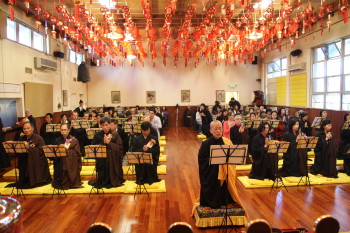 Guan Yin Blessing Ceremony
Guan Yin Blessing Ceremony Buddha’s Birthday Celebration & Gratitude Medicine Buddha Ceremony
Buddha’s Birthday Celebration & Gratitude Medicine Buddha Ceremony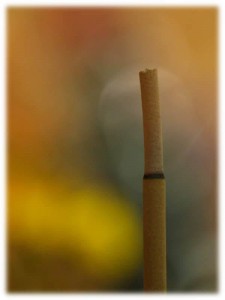 One Stick of Incense
One Stick of Incense
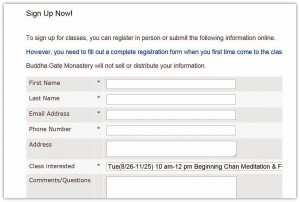
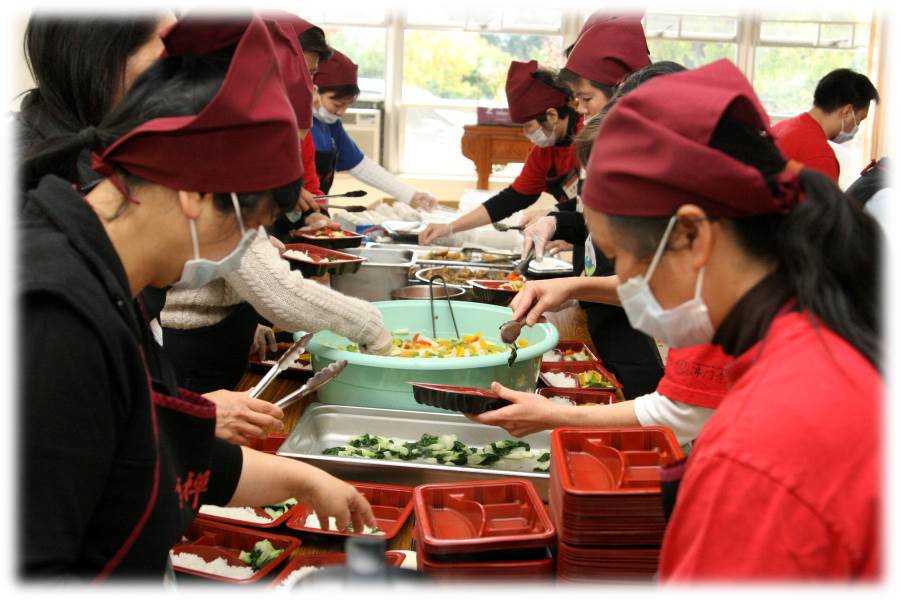
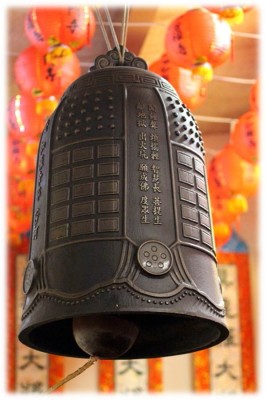




 The literal meaning of Vajraputra is Diamond Seed. Vajraputra symbolizes the invincible power of compassion and wisdom. One of the stories of Vajraputra is that he instructed Ananda (famous for his extraordinary memory by which he was able to retain all of the Buddha’s teachings), to harmonize the understanding of the Dharma with the practice toward Arhatship.
The literal meaning of Vajraputra is Diamond Seed. Vajraputra symbolizes the invincible power of compassion and wisdom. One of the stories of Vajraputra is that he instructed Ananda (famous for his extraordinary memory by which he was able to retain all of the Buddha’s teachings), to harmonize the understanding of the Dharma with the practice toward Arhatship.